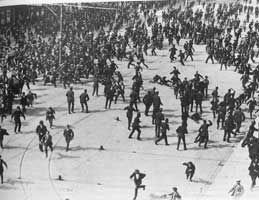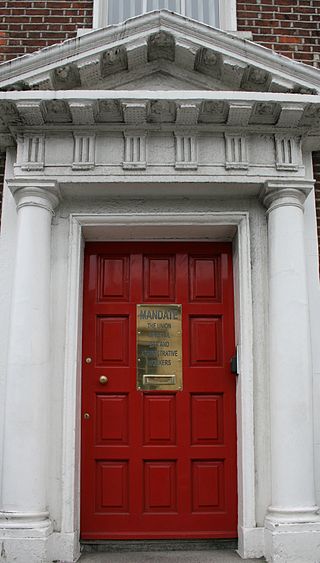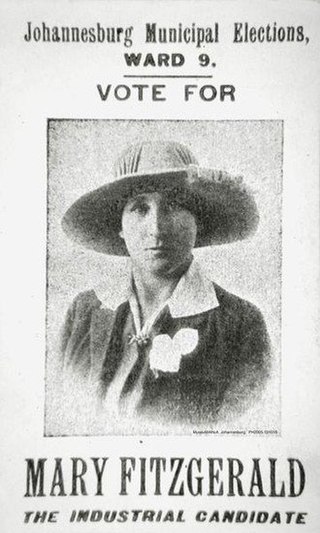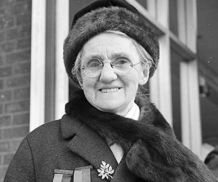Related Research Articles

Dunnes Stores is an Irish multinational retail chain that primarily sells food, clothes and household wares. It was founded by Ben Dunne in 1944. In addition to its main customer base in Ireland, the chain also has operations in Spain, and formerly in England and Scotland. The format of most of the chain's stores in Ireland involves a grocery supermarket operating alongside a clothing/textiles store, although some stores contain only textiles and some contain only a supermarket. The grocery side of the business does not operate outside of Ireland, save for a limited grocery range in the Spanish stores. The larger stores usually contain a café branded as either Café Sol, Dunnes Stores Café or Baxter & Greene Market Café.
Events from the year 1985 in Ireland.

The Dublin lock-out was a major industrial dispute between approximately 20,000 workers and 300 employers that took place in Dublin, Ireland. The dispute, lasting from 26 August 1913 to 18 January 1914, is often viewed as the most severe and significant industrial dispute in Irish history. Central to the dispute was the workers' right to unionise.
Michael Fitzpatrick was an Irish republican, Chief of Staff of the Irish Republican Army (IRA) and Clann na Poblachta politician.

Mandate is a trade union representing retail, administrative and distributive workers in Ireland.
Luke Joseph Duffy was an Irish trades unionist and Labour Party politician, who served for five years as a Senator.

Justin Michael Fitzpatrick is an Irish former rugby union player who most recently was head coach of the Houston SaberCats of Major League Rugby (MLR). He previously played for London Irish, Castres Olympique, Dungannon RFC & Ulster. He had also held several other coaching positions, including head coach of Dungannon RFC and the Seattle Saracens, and assistant coach of the United States national rugby union team.
The Congress of Irish Unions was a confederation of trade unions in Ireland.

Mary Fitzgerald was an Irish-born South African political activist and was considered to have been the first female trade unionist in the country. She was South Africa's first female master printer. As editor of the Voice of Labour, she published articles advocating for women's enfranchisement, racially integrated trade unions and revolutionary socialism. She played a lead role in the Black Friday Riots of 1913. She was the first woman to be elected to the Johannesburg City Council (JCC) in 1915 and later served as Deputy Mayor of Johannesburg.

William Francis Dunne was an American Marxist political activist, newspaper editor and trade unionist. He is best remembered as the editor of the radical Butte Bulletin around the turn of the 1920s and as an editor of the daily newspaper of the Communist Party USA from the middle-1920s through the 1930s. Dunne was founding member of the Communist Labor Party of America, but was removed from the national leadership of the party in 1934 and expelled in 1946 on charges of factionalism.

Rosanna "Rosie" Hackett was an Irish revolutionary and trade union leader. She was a founder-member of the Irish Women Workers' Union, and supported strikers during the 1913 Dublin Lockout. She later became a member of the Irish Citizen Army and was involved in the 1916 Easter Rising. In the 1970s, the labour movement awarded Hackett a gold medal for decades of service, and in 2014 a Dublin city bridge was named in her memory.
William A. Attley is a former Irish trade unionist and football referee.
The Dublin Council of Trade Unions is the trades council for County Dublin in Ireland.
Michael O'Lehane (1873–1920) was an Irish trade unionist.
The National Amalgamated Union of Shop Assistants, Warehousemen and Clerks was a trade union representing retail workers in the United Kingdom.
Michael Drumgoole was an Irish trade unionist.
The Irish National Union of Vintners', Grocers' and Allied Trades Assistants (INUVGATA), also known as the Barmen's Union, was a trade union representing retail and bar staff, principally in Ireland.

Cissie Cahalan was an Irish trade unionist, feminist, and suffragette.
On 19 July 1984, Mary Manning, a shop worker in the Henry Street, Dublin outlet of Dunnes Stores, refused to handle the sale of grapefruit from South Africa. Her union, IDATU, had issued directions to its members not to handle South African produce in protest of South African apartheid policies. When Manning and shop steward Karen Gearon continued to refuse to handle South African produce, they were suspended and ten IDATU members working in the store went on strike. The additional striking workers were:
Peter Joseph Tevenan was an Irish-British trade unionist and politician.
References
- ↑ Dermot Keogh, "Michael O'Lehane and the organisation of Linen Drapers Assistants", Saothar, vol.3, pp.33-43
- 1 2 "Michael O'Lehane", Irish Labour History Society
- 1 2 Arthur Marsh, Historical Directory of Trade Unions, vol.5, pp.119-120
- ↑ "Striking Back: The Untold Story of an Anti-Apartheid Striker". The Irish Times. 2013-03-21. Retrieved 2020-02-03.
- ↑ "Anti-Fascist Action, Ireland". Archived from the original on 2022-06-18. Retrieved 2009-10-26.
- ↑ "Strikers Refused Access to South Africa". RTÉ.ie .
- ↑ "Rebels for the cause: ThePost.ie". Archived from the original on 2005-05-12. Retrieved 2016-07-18.